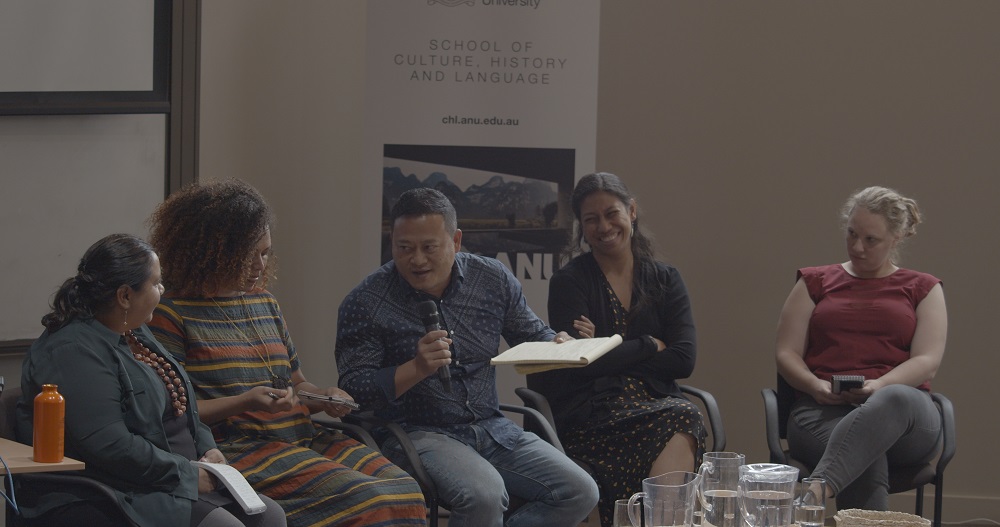DISCUSSION GUIDE
You can use these discussion questions in tutorial, classroom or workplace discussions after viewing the film “Decolonising the Academy: Trans-indigenous Possibilities”. We recommend thinking through the following before your discussion:
- Do you have a plan for a meaningful acknowledgement of country?
- Have you familiarised yourself with some key terms, like decolonisation and Indigeneity? Our resource list can help you with that.
- Put some thought into how your conversation is conducted. Does everyone have a chance to speak? How are you encouraging active and engaged listening? Are there people who always speak first or tend to dominate? Would breaking up into smaller groups help everyone have space to be heard?
- Are you taking notes that everyone can view later?
We recommend making time after your discussion of at least half an hour (preferably more) to dedicate to creating action items – ways to make change and continue these conversations. Make sure you insist on doing this – it’s easy to talk once and forget about it, but so important to make enduring spaces for conversation and real change. Here are some ideas on how to do this:
- Review your curriculum and syllabus.
- Consider how you can reinvigorate and continue these conversations. Could you organise smaller focus groups, annual forums or department meetings to address the importance of decolonising the academy?
- Find out how your university/workplace funds support for Indigenous students and/or staff. Write to people in leadership positions to ask to increase that funding.
- Form a reading group where you work through academic and media texts, or even films and podcasts together. Meet regularly and create a list of sources you read.
- If the discussion brings up a pattern of systemic issues, put some time into thinking about how you might change these. Some ideas for initial action are: a public co-authored open letter to your Dean or VC, a co-authored story in your student newspaper, or a policy recommendation formally made to your workplace’s leadership.
- Nominate an Indigenous person in your university or workplace for an award for their work.
1. INDIGENEITY IN THE ACADEMY
Discussion questions
- How do the people in the film describe the challenges they experience as Indigenous people in the academy? How does their indigeneity help them?
- Does your cultural knowledge inform the work you do? Do you think you have different or additional expectations of Indigenous people in your workplace or community? What are they?
- How do the film’s participants describe wearing “multiple hats”? What kind of work do they do in addition to research or teaching – for example, cultural obligations, institutional change, pastoral care?
- Are there people in your university or workplace who do multiple extra types of work like this? Is this additional work recognised and/or renumerated? How?
- How do the people in the film describe the kinds of support they rely on? Do you see those kinds of support in your university, community or workplace? What could you do better?
2. DECOLONISING TEACHING AND RESEARCH
Discussion questions
- For the people in the film, what is the importance of creativity and spirituality within the academy? How does this manifest in their teaching and research?
- How are the creative arts valued in the academy? Based on the film, do you think it is important to have an artistic practice within the academy and how do you think it can be used in your own work?
- How can diverse ways of knowing and being in the world be expressed in research and teaching practice? What strategies have you seen used by others? How can you adapt these in your own work?
- Do you make a distinction between academia and the communities you work with and for? How are those worlds connected or disconnected?
- How do we enact decolonial and anti-racist academic work in institutions that are inherently part of a settler colonial state? (Our resources page has some primers on these terms.)
- How do we uplift discussions of women, non-binary, LGBTIQ+/SOGIESC voices and issues within our teaching and research?
- Indigenous scholars have written about how research often extracts and exploits Indigenous knowledge, labour and experience. What kinds of research practices should we aim for instead, and what kinds of methods can we use in service of this?
3. TRANS-INDIGENOUS SOLIDARITY
Discussion questions
- How does your community or workplace honour the Indigenous people on whose land you live and work? How do you pay the rent? Can you think of ways to acknowledge sovereignty more meaningfully?
- How does settler colonialism and white supremacy manifest in your workplace or community? How can we improve the ways that we talk about and dismantle these
- What do you think of the potentials of solidarity in the academy between Indigenous people of the Pacific, Asia and Australia? What can institutions do to support such coalitions?
- Understanding and compassion between undergraduates, post-graduates, academics and professional staff is vital to build better universities. How do we enact a sense of community and comradeship within the academy? What barriers must we confront?
- What do you think is the role of allyship in the academy? Is ‘ally’ a word that resonates with you? What can those with white privilege do to better support Black and Indigenous people in the workplace?
- Visioning exercise: What does the ideal university look like for you? If you were made VC what would your first action be?

